Research
Armenia, Azerbaijan and Georgia at the UN General Assembly: Highlights on the Environmental Matters in 1992-2020
Authors: D. Ziganshina, A. Galustyan, D. Abasova
Information collection: I. Belikov
Design: A. Degtyaryova
Prepared as part of the UNECE Project “Support to the Network of Russian Speaking Water Management Organizations” financed by the Government of the Russian Federation”
© UNECE, SIC ICWC, authors
On the occasion of the 75th anniversary of the United Nations, platform experts analyzed the statements made at the general debate of the UN General Assembly by the countries from Eastern Europe, Caucasus and Central Asia (EECCA) with focus on the environmental matters.
The objective of this study was to identify how frequently and in what way the EECCA countries addressed matters related to nature use, the environmental conservation and transboundary cooperation from the UN tribune.
A summary review of Armenia, Azerbaijan and Georgia statements on the environmental matters is given below.
The Armenia, Azerbaijan and Georgia at the UN General Assembly: Highlights on the Environmental Matters in 1992-2020
[in Russian]
Download .pdf

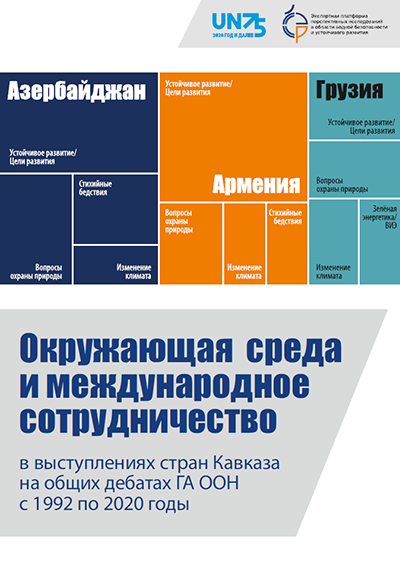
The environmental matters have not been among priorities in the statements of Azerbaijan, Armenia and Georgia. In some years, however, the countries addressed matters related to sustainable development, development goals, the environmental conservation, climate change and natural disasters.
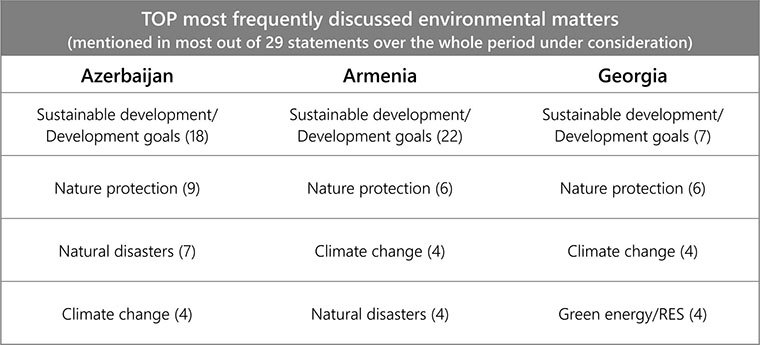
Azerbaijan


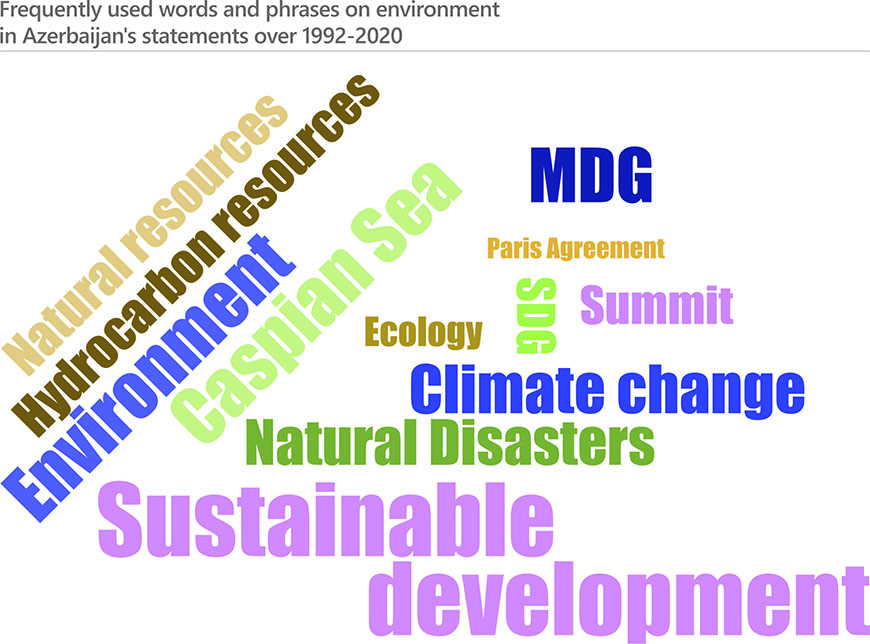
Armenia


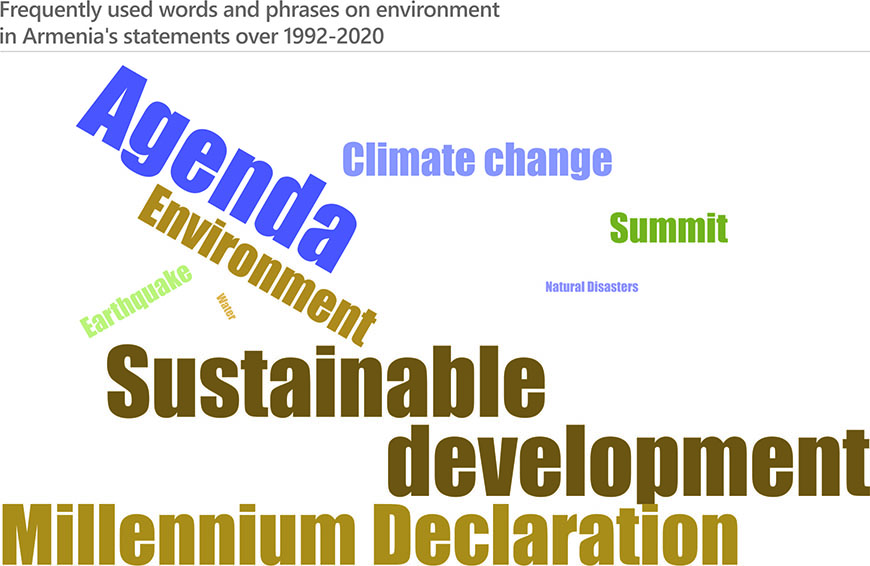
Georgia
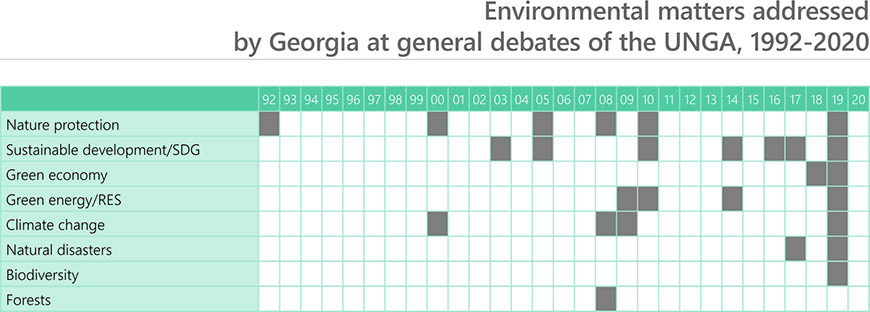

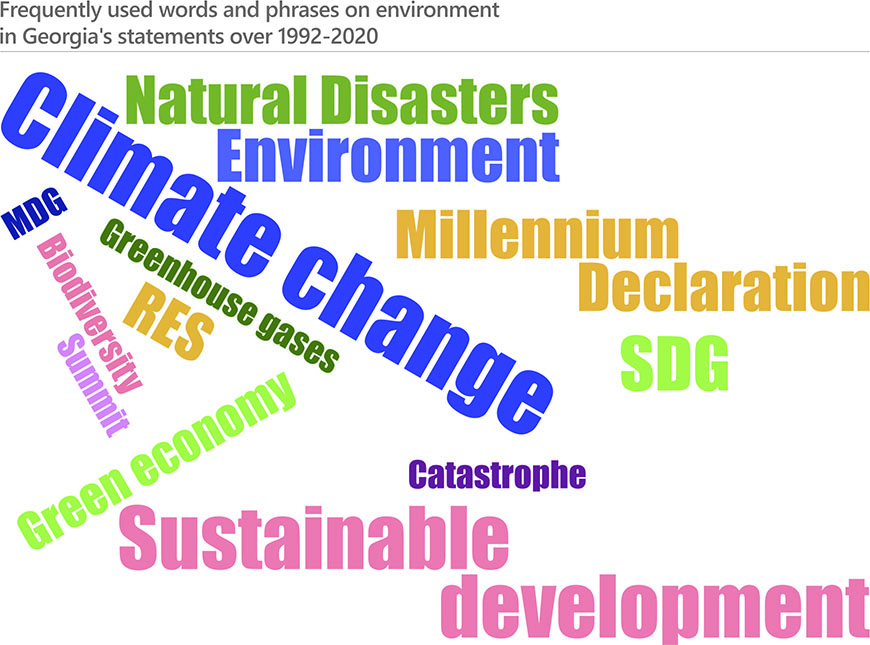
In most of their statements, the countries of Caucasus addressed generally sustainable development and development goals, with no particular emphasis on environmental problems. Azerbaijan was confident that national development strategies should be the primary framework for development cooperation. In 2010, the country shared its experience in achievement of Millennium Development Goals (MDG) and, having made progress in Sustainable Development Goals (SDG), presented twice its voluntary national review reports to the United Nations. Azerbaijan also reported on its assistance to countries in Africa, Asia and Latin America to achieve sustainable development (61/2006, 65/2010, 68/2013, 69/2014, 75/2020). Armenia included development goals in its long-term strategic programs and mentioned an important role in ensuring development of UN funds, programs and institutions. The country presented two voluntary national review reports on achievement of SDGs (60/2005, 64/2009 73/2018, 75/2020). Georgia supported MDGs, reported on steps taken to ensure sustainable development and took part in the development and implementation of the Post-2015 Development Agenda (60/2005, 69/2014, 71/2016, 74/2019).
Although in its first statement Azerbaijan named the progressing environmental deterioration on the global scale as the number-one threat, later on, the issues of environmental conservation were addressed in few statements only in the context of achievement of MDGs and as part of international cooperation development (47/1992, 48/1993, 49/1994, 50/1995, 51/1996, 60/2005, 61/2006, 65/2010, 66/2011). The country reported that the year 2010 was declared the year of ecology. Issues of “environmental protection” and “solution of global environmental and nature-protection problems” are addressed in the statements of Armenia in the list of global challenges and in the context of UN’s contribution to their solution (47/1992, 50/1995, 52/1997, 53/1998). Georgia spoke on a lesson that one should have learned from Soviet planning, it was that economic growth should never come at the expense of the environment (65/2010). It also underlined that “environmental security should be of direct concern to UN” (55/2000). In 2009, Georgia stated that it had been “in the forefront of fight against climate change by producing 85 per cent of electric power from ‘green’ and renewable sources” (64/2009) and 10 years later informed on the adoption of green economy and energy efficiency strategy (74/2019).
While speaking on climate change as a serious and long-standing challenge, effects of which are particularly felt in the country, Azerbaijan, however, addresses this issue briefly and in four statements only. It states that national policy and strategy are brought in line with international climate commitments, the Paris Agreement has been ratified, and steps are taken to limit and reduce greenhouse gas emissions (65/2010, 66/2011, 74/2019 è 75/2020). Armenia, as a small country, states that it “has no space, nor options to deal with” climate change and its effects. Establishment of an innovative climate financing mechanism is a part of Armenia’s national commitment made at the UN Climate Action Summit (62/2007, 74/2019). In four statements, where Georgia has addressed the issue of climate change, it underlined that the country was committed to the objectives of the UN Framework Convention on Climate Change and made obligations to reduce greenhouse gas emissions, while developing in parallel a climate action plan for 2021-2030 (55/2000, 63/2008, 64/2009, 74/2019).
Azerbaijan considers the effects of climate change – natural disasters (floods and fires) – in its four statements and mentions them in the context of relief assistance in three statements. It highly values and supports humanitarian activities of the United Nations and points out that the main role in development, implementation and coordination of humanitarian response should be played by respective states, while effectively dividing “tasks between national authorities and international organizations dealing with humanitarian aid and development” (60/2005). Armenia underscores the need for greater responsibility and joint efforts, resources and actions of all countries under the auspices of the UN. Georgia stated that “no country … is safe from natural disasters. Solidarity enables countries to become stronger in addressing these serious challenges.” (72/2017).
Challenges related to specific aquatic ecosystems were addressed by Azerbaijan only. The country made mention of “critical condition of the Caspian Sea” and plans to take all measures to save “the unique natural body” in its first statement at the UNGA, while expressing hope for assistance from the world community (74/1992). In all further statements, the Caspian Sea is mentioned only in the context of development of transport infrastructure, development and exploitation of hydrocarbon resources. It calls to refrain from the use and threat of force: “Free exploitation of natural resources and their transportation to world markets is an undeniable right of every sovereign State. The Caspian Sea must be a sea of peace and cooperation.” (56/2001).
